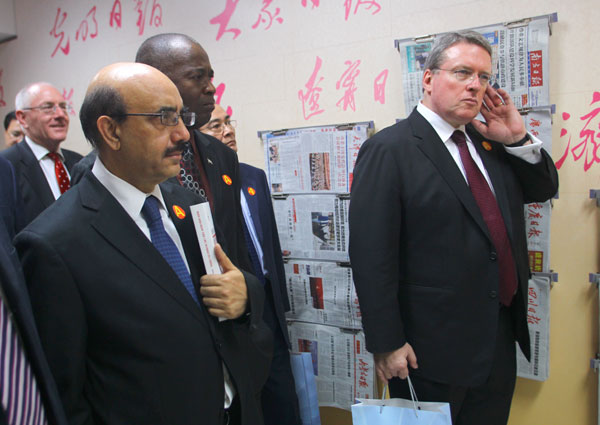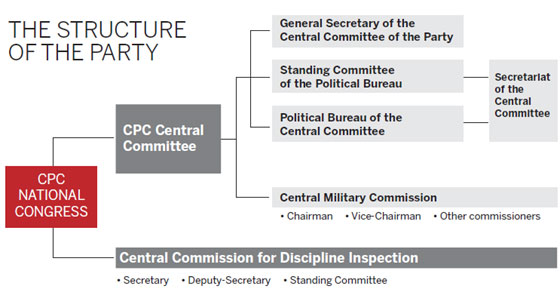Institutions open the door to scrutiny
By An Baijie (China Daily)
Updated: 2012-11-09 07:56
Many of China's major Party organizations are engaged in an ongoing project to promote greater openness and transparency, and provide better services. An Baijie reports from Beijing.
Located in an aptly nondescript hutong, or alley, in the Xicheng district of Beijing, China's Central Archives had long been a no-go area for ordinary citizens, discouraged by the presence of guards from the People's Liberation Army.
However, the organization, which is overseen by the Central Committee of the Communist Party of China has become less mysterious in recent years. The transformation began in earnest in May 2011 when more than 70 journalists from China and overseas were invited to visit the building and view some of the previously unseen material it houses.
 |
|
Masood Khan (left), Pakistan's ambassador to China, and other diplomats visit the Publicity Department of the CPC's Central Committee in Beijing. Zou Hong / China Daily |
The visit was part of an ongoing project to lift the veil of secrecy that has hung over many State organizations for decades, and make the Party's central agencies more transparent to the public.
Yang Dongquan, director of both the State Archives Administration and the Central Archives, said that the event had "opened a historic door".
The journalists were allowed to view some of the archives' most precious materials, including a handwritten composition by Chairman Mao Zedong, when he was a 19-year-old high school student in Shaoshan, his hometown in Hunan province.
In the piece, Mao gave his opinion on Shang Yang, a senior official during the Warring States Period (475-221 BC) whose reforms laid the basis of his kingdom's thriving economy and helped the emperor's offspring to unify China and establish the Qin Dynasty (221-206 BC).
|
 |
The journalists also watched videotapes of speeches delivered by Mao, former premier Zhou Enlai, and the architect of the reform and opening-up policy Deng Xiaoping.
Yin Li, director of the archives' publicity department, said the number of overseas visitors doubled in the 2007- 2011 period compared with 1997 to 2006.
|
 |
"Foreign individuals and organizations can apply for access to the material, all they have to do is present their passports," she said.
"Last year, an Italian researcher from the University of Venice applied to read material concerning the Sino-Italian relationship during the Cold War. We were able to offer her 52 documents relating to economics, culture and politics," she added.
Open to the public
In 2008, the archives established an information center covering more than 600 square meters. The facility is equipped with computers on which visitors can search for documents and other material.
Roughly 2,260 people from China and abroad visited the archives between May 2008 and June this year, viewing more than 4,600 documents, according to Yin.
"Serving the people is our most important function," said Yang. "At the same time, we must ensure the safety of all the documents and protect confidential material."
Around 40 percent of the material in the archives is now easily accessible, including more than 100 million paper documents, 160,000 photos, 16,000 audio and visual records and other assorted items.
